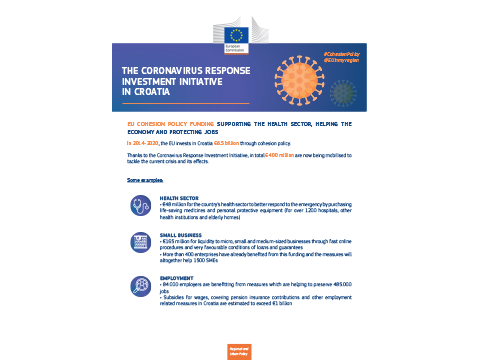Thanks to the opportunities provided in the context of the EU’s quick Coronavirus Response Investment Initiative, the Croatian authorities have already reallocated a total of € 400 million of Cohesion policy funds to address both the most pressing needs as well as longer-term social and economic consequences of the coronavirus pandemic. This support is proving essential for supporting the country’s companies and protect employment, but also for strengthening the healthcare syste
- 19 May 2020

Thanks to the opportunities provided in the context of the EU’s quick Coronavirus Response Investment Initiative, the Croatian authorities have already reallocated a total of € 400 million of Cohesion policy funds to address both the most pressing needs as well as longer-term social and economic consequences of the coronavirus pandemic. This support is proving essential for supporting the country’s companies and protect employment, but also for strengthening the healthcare system, which is under strain also due to the recent earthquake.
Commissioner for Cohesion and Reforms Elisa Ferreira said: "The EU, through Cohesion Policy, has taken action so that every available euro in the EU budget can be used to provide an effective response and fast relief measures for Member States and citizens. I am pleased to see that our Coronavirus Response Investment Initiative is already delivering results in Croatia, helping people, workers and businesses to deal with the difficult situation. I would also like to thank the Croatian Presidency for the important role played in the swift adoption of the emergency measures proposed by the Commission”.
Commissioner for Jobs and Social Rights Nicolas Schmit said: “Together with the Member States, the European Commission has taken steps to mobilise all resources to address the exceptional effects of the pandemic on our societies and economies. In Croatia this includes job preservation scheme for employees, measures to help the most deprived and financial support for the care sector. In this regard, I am happy to note that several measures have already been taken in Croatia. That said, processes could be sped up so that the support provided by Structural Funds can reach their intended destination.”
Since Croatian economy relies heavily on sectors like services and tourism, swift reaction is crucial to help the economy and preserve jobs, and the authorities have already put in place a set of actions. In particular, thanks to €165 million of EU funding Croatian micro, small and medium-sized businesses can secure liquidity under very favourable conditions, with fast online procedures. More than 400 enterprises have already benefited from this funding and altogether these measures will help 1500 SMEs. In addition, Croatia has reallocated almost €48 million of EU funds to purchase urgently needed health and medical equipment for over 1200 hospitals, other health institutions and elderly homes,.
To protect jobs, over half a million workers in most affected sectors and activities are receiving subsidies of their wages with the total amount across three months (March-May) estimated to exceed €1 billion. Measures for seasonal workers are also being put in place with financial aid for the workers in order not to completely lose their income. This will be particularly helpful for employers and permanent seasonal workers from tourism sector.
In addition, the companies that are currently involved in EU-funded projects, have been granted extensions of contracts and additional flexibilities which will facilitate project implementation in this extraordinary situation, including swift processing of payments.
The Commission services and Croatian authorities continue to work side by side in order to quickly identify and prepare further measures, where needed.
Background information:
The Coronavirus Response Investment Initiative (CRII) was launched to provide support to Members States by mobilising Cohesion policy funding to flexibly respond to the rapidly emerging needs in the most exposed sectors, such as healthcare, SMEs and labour markets, and help the most affected territories in Member States and their citizens. The EU also introduced extraordinary flexibility to allow the possibility for all non-utilised support from the European Structural and Investment Funds to be mobilised imminently in order to respond to the present crisis.
EU Cohesion policy provides a total of €8.5 billion during the 2014-2020 period, supporting growth and jobs in different sectors of the Croatian economy, ranging from transport to support for SMEs, energy, water, waste, health, education or social support. For example, Croatian e-School project, co-funded by the EU, has under current circumstances proved to be crucial in enabling pupils to continue learning from home. Another project which comes timely in the efforts of fighting the coronavirus pandemic is the Children's Hospital in Srebrnjak. Once completed in early 2022, the hospital will focus on development research and treatment methods for respiratory diseases of children and adolescents. Through EU funds, Croatia is also already investing more than €200 million for improved access to high-quality primary and emergency health care services and to hospital care. This encompasses procurement of medical equipment and infrastructural works on primary health centres in 16 counties, reconstruction and improvement of emergency admission in hospitals and clinical centres in six Croatian cities, equipping, reconstruction and improving access to 25 daily hospitals and clinical centres around the country, and procurement of six fast boats for the needs of the Emergency Naval Medical Service. All these investments contribute to the readiness of the Croatian authorities to fight the coronavirus outbreak.
More Information:
Factsheet: The Coronavirus Response Investment Initiative in Croatia
